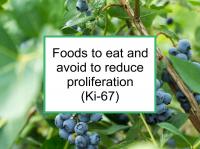Ki-67 (or Ki67) is used as a measure of the proliferative activity of breast cancer cells. High Ki-67 has been linked to unfavorable breast cancer outcomes. Ki-67 typically can be found on breast cancer pathology reports. Please see our article on Ki-67 and breast cancer outcomes for information regarding Ki-67 and prognosis.
Below we focus on foods that have been shown to reduce or increase proliferation of breast cancer cells in the laboratory.
Foods that have been shown to lower proliferation
The foods below have been shown to reduce breast cancer cell proliferation, as well as being chemopreventive in general.
- Apples
- Arctic char
- Artichokes
- Arugula
- Bell peppers
- Black cumin
- Black pepper
- Blackberries
- Blueberries
- Bok choy
- Boysenberries
- Broccoli & broccoli sprouts
- Brussels sprouts
- Buckwheat
- Cabbage
- Carrots
- Cauliflower
- Celery
- Cherries
Please read the applicable food webpages when making your own food lists since these pages contain important advice, food rankings (e.g., highly recommended, recommended in moderation), consumption limits, and other pertinent information.
Women with type 2 diabetes tend to have tumors with higher Ki-67 than non-diabetics. The anti-diabetes drug metformin has been shown to reduce proliferation.
Foods and supplements that can increase proliferation
The following foods and supplements have been found to increase breast cancer cell proliferation in the laboratory:
The U.S. beef, veal and lamb industries use zeranol (Ralgro), a non-steroidal formulation with estrogenic activity, as a growth promoter. Zeranol has been found to stimulate human breast cancer cell growth and proliferation. Exposure to bisphenol A (BPA) has been shown to increase proliferation of HER2+ and triple negative breast cancer cells. Similarly, exposure to phthalates has been reported to induce breast cancer cell cycle progression and proliferation even at relatively low concentrations.
Sources of information in this webpage
The food lists and other information above, which are updated continually as new research becomes available, have been developed based solely on the results of academic studies. Clicking on any of the foods will take you to its webpage, which contains specific information concerning that food's relationship to breast cancer, including its overall recommendation, as well as links to supporting studies.
Below are links to 20 recent studies concerning inflammation. For a more complete list of studies, please click on the tag Ki-67.
